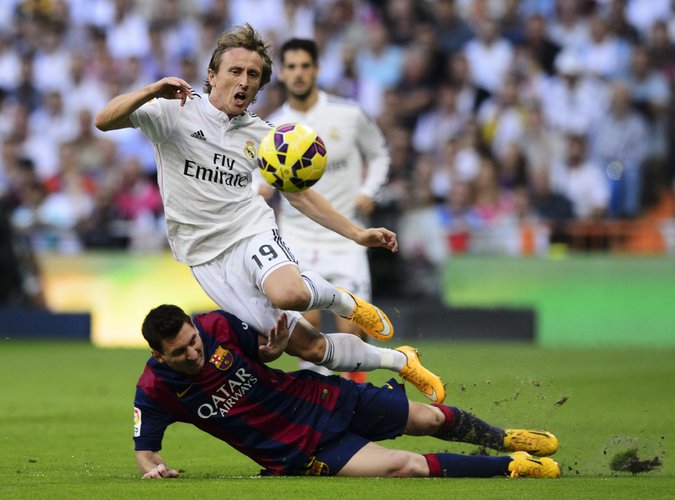
LONDON — The Clásico is one — make that two — league games per season, and they count for no more points than the rest. But as Europe moves its clocks from summer to winter time and the leaves fall, this contest had the look of a pendulum shift toward Madrid.
It was not simply that Real, Europe’s reigning champion, outplayed its Catalan foe in the Bernabéu; instead, it was the manner of the victory.
Coming from behind, against a team that had not conceded one goal in eight previous La Liga games, the Whites kept their heads, rhythm and confidence in check to win in a fashion that suggested they had more to spare than the final score of 3-1 suggested.
“I don’t know if I’ve found the perfect formula,” Madrid Coach Carlo Ancelotti told reporters after the game. “I liked many things of my team tonight. The physical aspect is very important. The tempo was high. We wanted to attack, with possession, using the wings. In the second half, we won because we wanted it.”
Barça, we can be sure, wanted it as well.
But desire is not enough. Neither is simply putting onto the field talents that cost two billion dollars for each team. After Neymar had given Barcelona such an early lead, and after Lionel Messi of all people had squandered an opportunity to double that, the better team, by far, won the contest.
Barcelona’s new coach, Luis Enrique, rolled the dice. He chose Luis Suárez on the right wing. The man who had not played a competitive game for four months was making a debut on multiple fronts — for his team, in a new league and in this, the most lauded of contests.
Yes, Suárez played a part in Neymar’s goal. One day, perhaps pretty soon, the Uruguayan will earn his starting role ahead of the tenacious Pedro or the precocious Munir. But the pace of Saturday’s game overwhelmed Suárez at times, leaving him isolated at points.
El Clásico is for the tried and the trusted. It came after just a few days of rest for both clubs following Champions League encounters. Ancelotti made a point of complimenting his players for keeping their heads together and their energy levels so high just three days after they won at Liverpool’s imposing Anfield Stadium.
He knew he could rely on Cristiano Ronaldo and Karim Benzema in attack and on Iker Casillas and Sergio Ramos in defense, because they have been there, done it in this series.
However, the fulcrum of Saturday’s victory was built on controlling the center of the field. Barcelona had, a tad surprisingly, gone back to Xavi Hernández and Andrés Iniesta, in hopes that Xavi might manage one last hurrah for the Clásico and that Iniesta would manage more of a game than his calf injury ultimately allowed.
Ancelotti had a changed midfield. His president, Florentino Pérez, is always acquisitive, always buying new stars and effectively saying to the coach, “You fit the jigsaw.” Even with all their qualities, James Rodríguez, the star of Colombia’s fine World Cup team, and Toni Kroos, a World Cup winner with Germany, both have needed time to adapt and integrate since joining Madrid over the summer.
Without the injured Gareth Bale able to fly down one wing on those fast counterattacks for Real, the coach has brought in Isco. A man who many believe is the future of Spanish soccer, Isco is more of a creative spirit than a swift winger. Yet Ancelotti works him in Bale’s role and educates him as few coaches can.
Ancelotti has won everything in the sport two times over, both as a player in Italy and as a manager in Italy, England, France and Spain. “Bale,” he said in the Bernabéu on Saturday, “is fundamental in this team and will play” when he is fit.
The coach had told Isco before the Liverpool and Barcelona games that the Spaniard already runs enough, and now must learn to be clever in his running.
There is a subtle difference, a line between effort and effectiveness. And there is on Madrid a player who might never get the headlines, even if his work is just as effective as that of Ronaldo and all the rest of the big names.
That player, Ancelotti’s key man in holding the middle ground and directing the moments when the team springs forward, is Luka Modric. Now 29, Modric is a true players’ player after a decade of knitting together teams in Zagreb, London and Madrid.
Elegant on the ball and energetic without it, he gives a team balance, patience and stealth. Why would we notice him, a player who seldom scores on a team of such prolific and wonderful strikers? Why highlight Modric, when in front of him is Ronaldo and behind him are two players who inspire debate, the wild and not always wonderful Pepe and Sergio Ramos?
Because, ultimately, Saturday was Modric’s night. He was the controller who outshone and outlasted Xavi. The architect whose efforts are meant to be sacrificial to the headliners.
Modric is, in that sense, a Croatian version of Ancelotti. He can exert influence while being as quiet as a mouse, at times as pragmatic as a judge. He understands the rhythm and flow of the game. He gives the right ball to the right player at the right time.
You can be sure that Enrique would have loved such a controlling figure in the Bernabéu because, despite all the riches he has up front, his Barcelona lost the contest in the midfield.